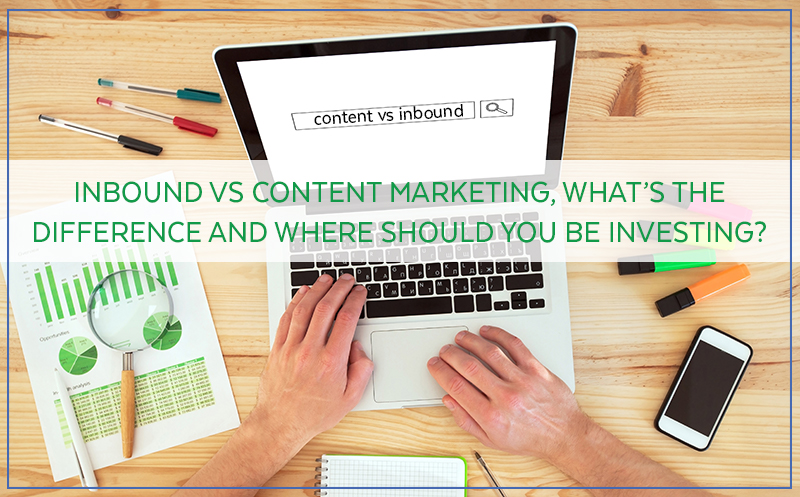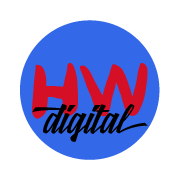Inbound Marketing vs Content Marketing – What’s the Difference?
There seems to be a new online marketing tactic being introduced to the digital marketing space every day. Agencies and SAAS providers seem to be shouting that you need to be implementing what they’re offering or risk losing out on business.
With so much jargon we wanted to start by shedding light on the differences between Inbound Marketing & Content Marketing.
When a business starts implementing online marketing their strategies are often unclear. Often due to confusion about:
- Which digital marketing tactics the business should be investing in.
- What outcomes you can expect.
We’re here to set the record straight on:
- The differences between content and inbound marketing,
- What’s involved and
- How to decide if it’s a suitable online marketing strategy for your business.
Let’s start by defining both of these powerful digital marketing tactics..
What is content marketing?
Content marketing involves publishing blog posts on your website and creating relevant, engaging content for your social media channels. It is one section of the Inbound Marketing pie.
A well planned content strategy is designed to answer questions that a potential client of your business might have. Think in terms of the questions that they might be asking search engines as they work towards finding a solution to a problem they want to solve.
Blog posts published on your website, or as a ‘guest expert’ on other industry related websites should be designed to attract people looking for the product or service you offer. Social media content gives you the opportunity to connect and engage with people when you publish information that’s interesting to them.
A well-executed content marketing strategy positions you as the go-to business in your field and ensures that you are easily found online, increasingly often. Once a visitor has been attracted to your website from your content marketing efforts, other elements of inbound are triggered.
What is Inbound Marketing?
The inbound marketing process is centred on publishing high quality, interesting and relevant information on your website and social media channels. In other words, content marketing forms the foundation for inbound marketing.
Modern purchasing behaviour involves a very different decision making process to the pre-digital era. Today, in excess of 80% of consumers will conduct online research prior to making a purchase or selecting a service provider. Inbound marketing is perfectly placed to capitilise on this buyer behaviour.
Inbound Marketing focusses on attracting the right customers to your business.
Customers who are in the process of looking for your product or service. This is done by offering tailored content aimed at your target audience and supporting it with a strategic follow up process. Inbound marketing seeks to fully understand the nature of your client’s problem before you ever have a conversation with them.
The inbound technique combines many online marketing tactics into a single, data-driven and strategic approach. Inbound amplifies the results of content marketing alone.
Elements of inbound marketing include:
- SEO
- Social media
- Website content
- Blog posts
- Calls to action
- Content offers (eBooks, webinars, video training, etc)
- Email nurturing
- Sales automation triggers
The ideal customers and clients of a business are well understood and the marketing strategy is designed to funnel visitors towards a product or service they are already looking for.
Inbound marketing is more sales focused than content marketing.
By comparison inbound marketing is more deeply integrated with the sales process than content marketing. A good inbound strategy is designed to ensure that leads created are high quality. Once a lead has found your business they are guided through each step of the sales funnel. Their pathway is dependent on the type of content that they are most interested in.
A good inbound marketing strategy is designed to convert visitors to leads and leads to customers, providing value at every step of the journey and then empowering them to promote your business for you.
The outcomes of this end to end strategy are
- Warmer leads,
- Higher conversion rates and
- Increased revenue for you.
Content marketing does not go this deep.
There’s often a call-to-action to rouse a customer’s interest. This might be an eBook or white paper offered in exchange for name and email address. This gives the business the opportunity to remarket to this particular customer down the track and tailor this communication to their needs. It also gives the company insight into what their customers are looking for, and therefore able to offer higher quality content.
Think of content marketing as a first step in implementing inbound marketing methodology for your business.
One similarity between inbound and content marketing is that the marketing efforts are customer focussed. Both revolve around the ethos of being helpful, informative and specific to the customer’s needs.
Creating content that answers your customer’s questions builds trust. It’s this trust that is often so hard to come by in old-school outbound marketing.
The benefits of both inbound marketing and content marketing are plentiful.
Communication goes both ways.
With traditional outbound methods the marketer does all the talking. Pushing what they want the customer to hear out into the marketplace. Inbound is the opposite, allowing interaction to work both ways. By analysing content, understanding where people are clicking and what information they’re engaging with, you’re able to gather valuable market data.
Inbound Marketing is Unobtrusive.
A recent poll by HubSpot showed that an alarming 84% of 25-34yo’s have left a favourite website because of intrusive & irrelevant advertising. This is a HUGE number of visitors bouncing away from a website because of outdated advertising techniques.
Inbound marketing only kicks into action when a customer is searching for your product. When they find you – they were already looking to invest in the type of services that you offer.
Inbound and content marketing are cost effective.
Inbound marketing is a cost effective method of advertising. In the same HubSpot poll mentioned above, it was shown that companies using inbound marketing are spending 62% less that those who invest in outbound.
The return on investment is also greater. Because leads coming to you via your website they’re already warm. You can be confident that they are looking for a product or service you offer, meaning you’re over half way to closing a sale.
Ultimately the differences between Inbound Marketing and Content Marketing are inconsequential when considering your overall marketing strategy.
If either of these techniques are being implemented, then you’re off to a great start. If you’ve made a start on content marketing but not yet explored how inbound marketing could be applied, using content you’ve already created, get in touch with us. We will happily show you what the next steps are and how to make that content work harder for you.
How do you know if Inbound Marketing or Content Marketing are right for your business?
There are very few business types that won’t benefit from implementing a robust content or inbound marketing strategy. However, with so many different online marketing tactics available to you the important thing to decide is whether it’s the best type of digital marketing for you to invest in for your business.
A few things we help our clients consider when deciding if inbound marketing is the right approach for them include:
Size of market – How many people are there looking for their product or service.
Growth goals – How many new customers or clients does the business need to achieve their growth goals, or do they simply want to maintain their current position.
Average customer lifetime value – How much is a new customer or client worth to the business.
Considered buying process – How much research does the average customer do before making a decision. For businesses that are more likely to inspire impulse purchase content marketing will likely win out over inbound.
Conversion rates – Conversion rate optimisation, whilst not strictly part of inbound marketing, has a considerable impact on the ROI when implementing either tactic. If your website needs some work on conversion rate, we’ll recommend doing that BEFORE implementing content or inbound marketing.
As a digital marketing agency we won’t push you down a path that’s not the best fit for you. We’re specialists at specific elements of digital marketing. If, during our initial conversations, we discover that you’d be better off implementing something we don’t offer we’ll introduce you to someone we trust who can.
How can we help you?
Hardwood Digital offer a few different options for how we can work with you to implement inbound and content marketing.
Done with you – Quarterly advice & accountability.
Perfect for business owners who can dedicated about 3-5 hours a week to their inbound marketing. You’ve probably tried a few things ad-hoc or know it’s a good fit for you but don’t really know where to begin.
Shoot us an email for more details or come along to our upcoming workshop to undertake the planning phase.
Done for you online marketing strategy
Confident that you have the resources to implement online marketing for your business but unsure exactly what needs to be done? We can create a complete 12 month online marketing strategy for you.
Done for you content marketing
Keen to try content marketing for yourself but know that you don’t have the resources or skills in house to do it. Hardwood Digital offer a comprehensive content marketing package where we do the content creation for you.
Done for you inbound marketing
Interested in going the whole hog but not sure where to begin. We can do it all for you, or work in partnership with you team in house. You may have already started implementing inbound but aren’t seeing the results you were hoping for. Again, we can work with you to start getting the outcomes you want to achieve.
Not sure which is the best option for you? Let’s start with a conversation.
[caldera_form id=”CF57552a973c14a”]


